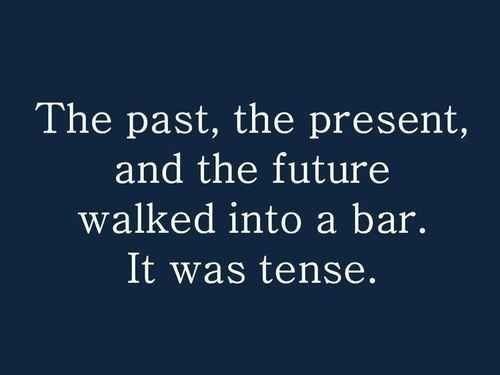 When considering tense in a first person narrative, let’s think about the way we talk.
When considering tense in a first person narrative, let’s think about the way we talk.
If I’m talking about someone who’s still alive, I’ll say, “He’s so funny, conversations with him are a hoot.” However, if the gentleman is dead, we say, “He was so funny. I loved my conversations with him. He could have me laughing at the drop of a hat.”
If I’m talking about the Tennessee Aquarium, I speak of it in the present tense. However, I speak of the World Trade Center Towers in the past tense.
Those are extreme examples, but we do the same with everything in our lives. I speak of the sofa-sleeper that used to be in our family in the past tense, and the wrap-around sofa in the present tense.
“The sofa sleeper was so uncomfortable, but I love the way the chaise on this sofa supports me when I work.”
Two tenses in the same sentence, and it’s correct. Tense was designed so people will know if you’re referring to the past, present, or future.
Here’s a teaser from Ghost (releasing October 14th)
I’ve read about people wanting a spanking — women who act bad just so their husband will paddle their bottom — but no way was I ever going to want this. Dare’s a werewolf and he’s fucking strong. I know he doesn’t spank with all his strength, but that doesn’t matter because it’s more than I can handle and I was screaming and begging from the first strike.
She starts out speaking in the past tense, but since Dare is still a werewolf, Hailey doesn’t speak of his status as werewolf in the past tense. If she did, readers would think I (the author) was foreshadowing some traumatic event that would either kill him or make him human again. I do foreshadow a little with the final sentence, because the wording clearly tells the reader he’s still spanking her. We don’t know if this was written a year later or five years later, but she’s still being spanked.
The side of Missionary Ridge is damned steep, but we’re wolves and we’re strong, so we easily managed the terrain. Nix climbed the tree he’d chosen, and I moved to the base of another tree and blended into my surroundings.
No one’s taken earth movers to Missionary Ridge. It’s still there. Also, Ghost and Nix are still wolves, so we say it in present tense. Then we move back into the narrative of what happened in the past, so it’s past tense.
Don’t let the people who don’t understand grammar bully you into talking about someone who’s still alive in the past tense. Seriously, just don’t. If they’re alive, we talk about them as if they’re still alive — even if the book is written in past tense. We talk about what they did in the past tense, but — unless they’ve died since these events happened — we talk about their attributes in the present tense.
The same goes with things — if you’re telling us the house is green, then write it as the present tense unless 1) the house has since burned down or been destroyed in an earthquake or 2) someone came along and painted it another color.
There are rules about how to switch tense within a sentence, and I don’t always get it right. Sometimes, I fudge the rules because it’s the way the character would speak. Other times, I write it the way most readers will understand — even if I’m aware it may make the college English professors out there start twitching. It’s probably important to point out I do this with all English rules, not just the ones on tense — and this will likely be the subject of my next discussion on writing commercial fiction: When to break the rules. (Hint: It has to do with character development.)